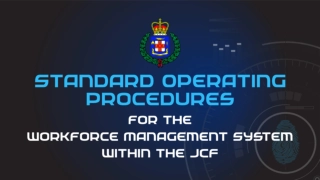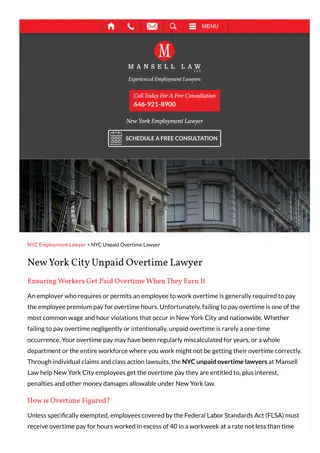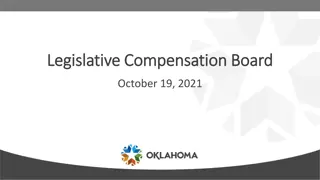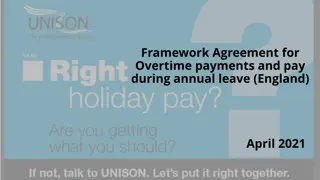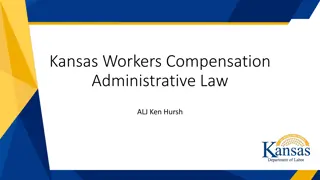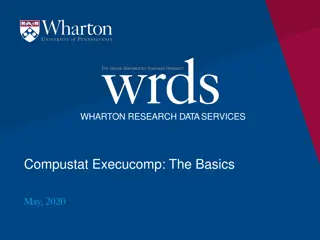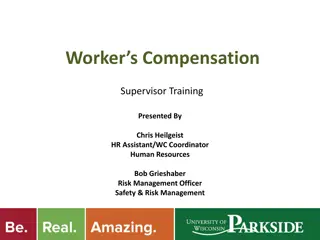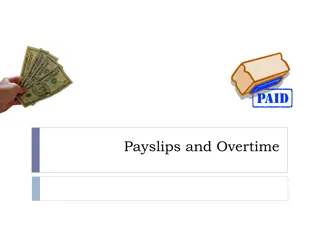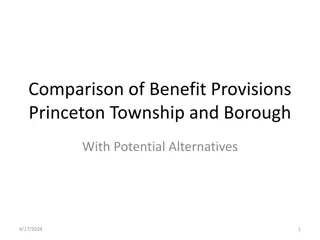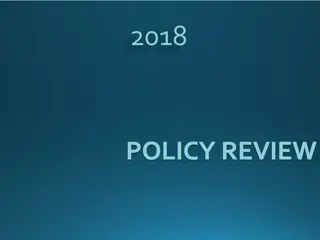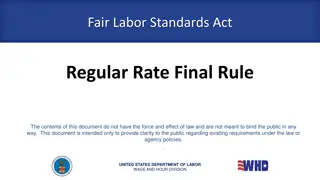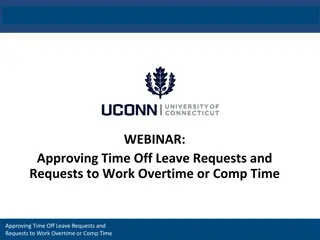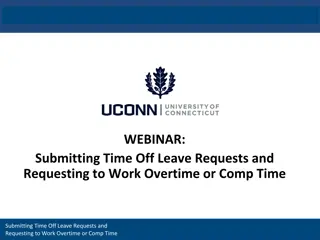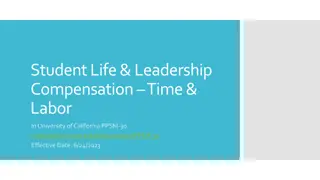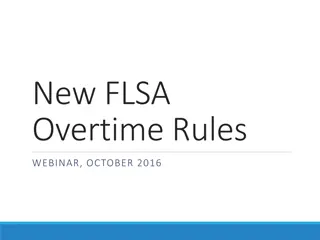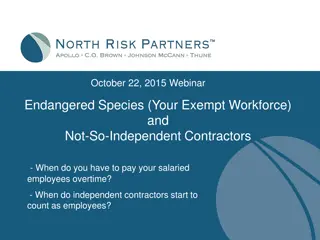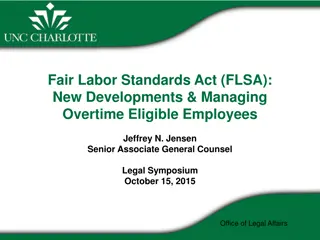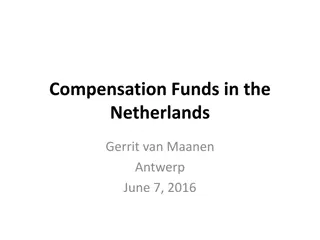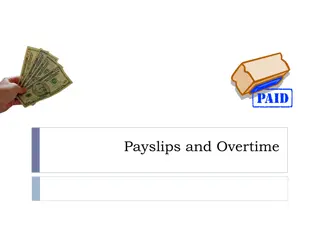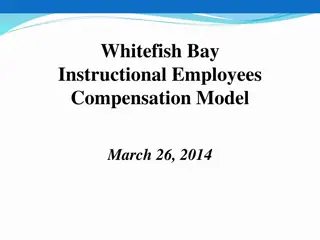Understanding Compensation, Overtime, and Time Reporting Policies
This content discusses important topics such as compensation, overtime, exempt vs. non-exempt classification, and salary thresholds. It aims to provide a comprehensive understanding of the rules and regulations surrounding time reporting and compensation for staff and academic employees. Topics covered include managing worked time, calculating overtime, and reporting time accurately.
Download Presentation

Please find below an Image/Link to download the presentation.
The content on the website is provided AS IS for your information and personal use only. It may not be sold, licensed, or shared on other websites without obtaining consent from the author. Download presentation by click this link. If you encounter any issues during the download, it is possible that the publisher has removed the file from their server.
E N D
Presentation Transcript
Compensation, Overtime Compensation, Overtime & & Time Reporting Time Reporting POLICIES AND BEST PRACTICES 1
Table of Contents Table of Contents I. II. III. IV. V. VI. VII. Meal Breaks and Rest Periods VIII. Travel IX. Camps X. Volunteer Time vs Employee Time XI. Probationary Period XII. Relevant Policies Overview Compensation Overtime and Compensatory Time Time Reporting Workweek Alternate Work Schedules 2
Compensation and Time Reporting Compensation and Time Reporting For Staff and Academic Employees The purpose of this training is to provide a comprehensive understanding of the rules and regulations surrounding time reporting and compensation at the UC. At the end of the training you should have a stronger understanding of how to: manage your time worked calculate overtime report time 3
Compensation Compensation Exempt vs Non-Exempt 4
Compensation Compensation (Exempt vs Non-Exempt) Position titles determine pay scale and Fair Labor Standards Act (FLSA) exemption status (exempt or non-exempt). The FLSA status on each title is determined and maintained by the UC Office of the President and are not negotiable. Position Analysis determines the job title and salary guidelines of position based on the defined duties and responsibilities. Career Tracks (non-represented staff) Series Concepts (represented staff) Academic Series Concepts (academic positions) 5
Compensation Compensation (Exempt vs Non-Exempt) What is exempt vs. non-exempt? Employees whose jobs are governed by the FLSA are either "exempt" or "non- exempt." FLSA guides whether a position is exempt or non-exempt and that designation is determined prior to a classification/title being released to ANR for use. Non-exempt employees are entitled to overtime pay. Exempt employees are not. 6
Compensation Compensation (Exempt vs Non-Exempt) Salary Threshold for Exempt Status Any employee in an otherwise "Exempt" position classification who receives an actual salary rate that is less than the equivalent of $913* per week must be administered as Non-Exempt during that period, regardless of the amount of the employee's annualized FTE pay rate. Human Resources does bi-annual reviews of exemption statuses to ensure compliance, however it is a supervisors responsibility to appropriately ensure overtime pay is in place. Upon hire and upon change in compensation, supervisors can do a quick calculation to ensure the employee is appropriately placed. If you note an employee needs their exemption status updated, please contact humanresources@ucanr.edu. Calculation: Hourly rate of pay x 40 (hours per week) = weekly pay. If below $913, the employee must be non- exempt by federal law. *Subject to change, currently undergoing federal review. 7
Overtime and Compensatory Time 8
Overtime and Compensatory Time Overtime and Compensatory Time (Non-Exempt Employees) Non-Exempt employees may receive either compensatory time off (comp time) or pay for overtime worked. Straight Time - Up to40 hours of work in a given workweek is compensated at 1 hour for each hour worked. Premium Time - More than 40 hours of work in a given workweek is compensated at 1.5 hours for each hour worked. Exceptions For SX represented employees premium time is in place after 8 hours in a day. 9
Overtime and Compensatory Time Overtime and Compensatory Time (Non-Exempt Employees) General Rules Time (hours and days) worked outside of the employee s regular schedule must be approved in advance (even if under 40 hrs a week). Time worked unapproved must be paid regardless of prior approval. An employee is expected to seek advance approval for overtime and over-schedule work. If an employee fails to do so, other personnel actions may occur. If overtime pay is elected the employee must be paid for overtime rather than being provided an option for compensatory time, after the fact. An employee is allowed to elect either compensatory time off or overtime paid. 10
Overtime and Compensatory Time Overtime and Compensatory Time (Non-Exempt Employees) General Rules Cont. Elections for overtime and/or compensatory time only occur once a year. An employee must be permitted to use compensatory time within a reasonable period after making a request if the use of the compensatory time will not unduly disrupt the operations of the department. Generally, accumulated compensatory time (CTO) can remain in the bank for six- months, after which the employee will need to take compensatory time off work or make an agreement with the supervisor for additional time to take the hours off. Multiple part-time appointments are combined for the purposes of calculating straight and premium overtime. 11
Overtime and Compensatory Time Overtime and Compensatory Time (Non-Exempt Employees) Pay out of Compensatory Time Occurs as follows: Upon the employees separation. Payment for accrued hours of premium overtime will be based on the employee s regular rate of pay at the time of separation or the employee s average hourly rate during his/her last three years, whichever is higher. Other accruals of compensatory time will be paid at the employees pay rate at the time of payment. Upon promotion, reclassification, demotion or transfer to another department or location. Upon changing position type from non-exempt to exempt within the location. If not taken as compensatory time off within one year. If an employee accrues compensatory time but changes their election to overtime earnings during the election cycle. 12
Time Reporting Time Reporting ANR utilizes the UC Davis Time Reporting System (TRS) which is the system responsible for tracking hours for biweekly employees and non-work hours for both biweekly and monthly employees. Non-Exempt (Biweekly paid) Employees enter all work and all leave hours on their timesheet Exempt (Monthly paid) Employees enter their leave hours OR report the absence of any leave hours on their timesheet 14
Time Reporting Time Reporting All hours worked must be entered into the TRS system and cannot be tracked in side agreements or separate systems. In order to manage and effectively address our legal and regulatory responsibilities as an employer, this system is required for all time reporting. Calendaring and spreadsheets in addition to the TRS system is acceptable as long as all hours match what is entered into TRS. 15
Time Reporting Time Reporting When an employee submits their timesheet, they are verifying that this is the legal and official record of time worked. By submitting the timesheet each employee is verifying I understand any misstatement or falsification of hours on this time sheet may be cause for disciplinary action up to and including termination. 16
Travel 17
Travel Travel Non Non- -Exempt Employees Exempt Employees Same Day Assigned travel during an employee s regular working hours on work days is counted as time worked. Traveling from work site to work site during the workday counts as time worked. Regular Work Hours Travel time during scheduled days off is counted as time worked. Travel time between home and the work place is not time worked, unless the alternate work site is outside the normal commuting area of the employee s home location. Time spent traveling from job site to job site outside of regular work hours is considered overtime. Travel from job site to home is not counted as overtime or time worked. Overtime Time spent traveling by plane outside of the commute area is considered time worked. Hours worked outside of the regular work hours (including travel) must be approved in advance. 18
Travel Travel Non Non- -Exempt Employees Exempt Employees Overnight Travel that keeps an employee away from home overnight counts as hours worked when it cuts across the employee's workday, both on regular working days and during those corresponding hours on nonworking days (weekends). Regular Work Hours o Time spent on an airplane or as a passenger in a vehicle does not count as time worked if it is outside of regular work hours. The time spent traveling from home to the airport and the airport to home shall not be time worked. Travel that keeps an employee away from home overnight and that occurs outside the employee s normal working hours is not considered as hours of work. Overtime If an employee is a passenger while traveling outside of regular work hours but is working during those hours; this is considered time worked/overtime. Hours worked outside of the regular work hours must be approved in advance. 19
Travel Travel Scenarios Scenarios (Non-Exempt Employees) Sara Trainer works various hours during the week, but typically works from 7:00 am 4:00 pm, Monday through Friday. On Tuesday, she participates in a training in a nearby county leaving at 7:00 am and arriving by 9:00 am for the start of the training. She takes a one hour lunch. She then leaves the training at 4:00 and drives home, arriving at 6:00 pm. She is paid for the additional travel time at the end of her shift because it is not overnight travel. Sara has worked 8 hours of regular time and 2 hours of overtime premium (time and one half). 20
Travel Travel Scenarios Scenarios (Non-Exempt Employees) The next week Sara goes to a training further away, and stays overnight. She leaves at 6:00 in the morning for the airport. She flies to her training and arrives at 9:30 am. She checks into the hotel and telecommutes from the hotel until the end of her regular shift at 4:00. The next morning she goes to the training, starting at 8:00 and ending at 5:00. Both days she takes an hour lunch. She takes a cab to the airport arriving at 6:00 pm. She flies home and arrives at 8:00. Sara is paid on the first day starting at 7:00 when her shift would normally begin. Sara is owed pay for two regular workdays, but no overtime because it is overnight travel. 21
Travel Travel Exempt Employees Exempt Employees Exempt employees are paid an established salary and do not receive overtime compensation or compensatory time off, therefore are not compensated for travel outside of normal business hours. 22
Work Schedules and Alternatives 23
Work Week Work Week CX - A standard workweek is from Monday morning (12:01 a.m.) to midnight the following Sunday. All Others - A standard workweek is from Sunday morning (12:01 a.m.) to midnight the following Saturday. 24
Alternate Work Schedules Alternate Work Schedules Alternate work schedules are allowed per policy/contract. Each work schedule has it s own advantages and disadvantages for the employee, the organization and for the calculation of overtime pay and holiday pay. Any work over 40 hours in a week is considered overtime for non-exempt employees, even if the employee is on an alternate work schedule. It is critical to consider these factors prior to determining a need for an alternate work schedule. In the event the University decides to abolish, establish or change alternate work schedules in an entire work area, the University is required to inform the applicable unions at least 30 calendar days prior to taking such action. 25
Alternate Work Schedules Alternate Work Schedules Union Represented Employees: CX (Clerical Union): Employees may request alternate work schedules. The University will review the feasibility of implementing alternate work schedules in those work units for which the employee(s) indicate(s) there is an interest in such schedules. The University may at its discretion grant such requests. Such requests shall not be unreasonably denied. RX (Research Professionals) and TX (Technical): Alternate work schedules may be established by the University to ensure adequate staffing and coverage to meet operational requirements. An employee may request an alternate work schedule. SX (Service): Alternate work schedules may be established by the University. Employees may request alternate work schedules. The University will review the feasibility of implementing alternate work schedules in those work units for which AFSCME indicates there is an interest in and suitability for such schedules. 26
Alternate Work Schedules Alternate Work Schedules Non-Represented Employees: PPSM: An employee may request an alternate work schedule in accordance with local procedures. Alternate work schedules are approved at management s discretion. 27
Meal Breaks and Rest Periods 28
Meal Breaks and Rest Periods Meal Breaks and Rest Periods UC Under 5 hours 5+ Hours 12+ Hours Standard One 30 minute meal break is required. Waivers allowed in emergencies or if scheduled less than six hours in one day. Meal Break Not required Two 30 minute meal breaks are required. One 15 minute rest period required if workday is at least 3 hours Rest Periods Two 15 minutes rest periods required. Three 15 minute rest periods required. Rest periods can occur anytime during the workday but are not to be added to the beginning or end of the shift. Meal or rest periods can occur anytime during the workday but are not to be added to the beginning or end of the shift. Meal or rest periods can occur anytime during the workday but are not to be added to the beginning or end of the shift. When Supervisor authority to determine when meal and rest periods occur and when/if a break period can be attached to a lunch period. Meal periods must be notated for non- exempt employees. Supervisor authority to determine when meal and rest periods occur and when/if a break period can be attached to a lunch period. Meal periods must be notated for non- exempt employees. Supervisor authority to determine when rest periods occur. Authority Time Reporting 29
4 4- -H Camp Time Management H Camp Time Management Camp Only Employees 4-H Camp employees are paid a flat rate of pay, per camp. These By Agreement rates (BYAs) are set annually in accordance with UC Policy and labor law. Camp employees do not track hours or fill out time sheets. Current UC Employees with Camp Duties Those employees who work for ANR already and take on additional camp responsibilities are paid as usual and may fall under On Call status and may incur overtime, so plan accordingly. 31
On Call Status On Call Status On Call status means that an employee is waiting for the possibility to return to work if needed but that they are not presently working. On Call - Unrestricted means the employee is free to engage in activities for his/her own purposes during the time they are not working, but could on call. Standard overtime/compensatory time provisions still apply. On Call - Restricted will be considered time worked because the employees personal time is being restricted, i.e. an employee is required to restrict personal activities so that the employee cannot use his/her time effectively for the employee s own purposes. 32
On Call Status On Call Status In a situation where an employee is on location or on call for more hours than their regular work schedule, but are not scheduled to work the employee is placed on a special status and are not always considered working until there is a genuine need for their services. In these cases, the employees are considered On Call-Unrestricted for a predefined amount of hours outside of their regular work schedule. When work occurs during this predefined period, they are compensated accordingly. Also, the employees cannot be required to work during this extended period without appropriate breaks, meals and free time, so please plan accordingly. In all On Call situations, overtime rules still apply. 33
Volunteer Time vs Employee Time Volunteer Time vs Employee Time ANR Employees occasionally also moonlight as volunteers for our many outstanding programs. This can, however, prove complex for time management. If a volunteer is hired as an employee it is recommended they no longer volunteer for functions outside of work, to make a clear differentiation. If it us unavoidable or an employee feels strongly about continuing their volunteer service, a written agreement is necessary. During each volunteer project the employee must be keenly aware that this is strictly voluntary and non-work related. Volunteer hours MUST be voluntary. Employees who are required to show up are required to be paid. If volunteering during regular work hours, vacation must be used. Employees must also be fully informed of their liability during volunteer hours as it is not always covered by UC. 34
Probationary Period Probationary Period Employees new to the UC system must serve a probationary period. In some circumstances overtime worked counts towards the probationary period, therefore employees should have their overtime activities monitored strictly while on probation. 35
Relevant UC Policies and Labor Agreements Relevant UC Policies and Labor Agreements UCOP Policy and Procedure main page: http://www.ucop.edu/local-human-resources/policies-guidance/index.html TRS training and FAQ s: http://afs.ucdavis.edu/systems/time_reporting_system/index.html Labor Agreements: http://www.ucop.edu/local-human-resources/policies-guidance/labor-agreements/index.html UC PPSM 30 Salary: http://policy.ucop.edu/doc/4010400/PPSM-30 UCOP Policy PPSM 2.210: Absence of Work Policy: http://policy.ucop.edu/doc/4010406/PPSM-2-210 UCOP Travel Regulations: http://policy.ucop.edu/doc/3420365/BFB-G-28 Probationary Period: http://ucanr.edu/sites/ANRSPU/Supervisor_Resources/Probationary_Period/ 37
Contact Us Contact Us Contact us: HumanResources@ucanr.edu Staff HR website: http://ucanr.edu/sites/ANRSPU/ HR Help Center: https://ucanrhelp.zendesk.com/ 38
THANK YOU! THANK YOU! 39

 undefined
undefined




